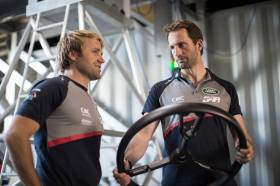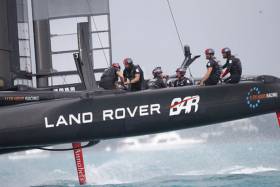Displaying items by tag: Sir Ben Ainslie
British sailing legend Sir Ben Ainslie is stepping down as driver of Emirates Great Britain SailGP Team, as Marine Industry News reports.
The Olympic Games’ most successful sailor to date will be succeeded by fellow Olympic medallist and America’s Cup teammate Giles Scott as he intends to set his focus on the latter event.
Sir Ben will continue as chief executive and majority owner of Emirates GBR.
Announcing his decision just weeks after his final SailGP race as driver in Dubai, Sir Ben said it is “time for the next generation to come through”.
He added: “As the CEO of both Emirates GBR and the INEOS Britannia America’s Cup Team, and most importantly, a husband and father, at some point, you’ve got to realise that you can’t do everything.”
Marine Industry News has more on the story HERE.
SailGP in Sydney: GB Team Accused of Reckless Sailing After Collision Costs Japan Its Bow
The driver of Japan’s SailGP boat has tempered his criticism after accusing the GB team of reckless sailing in the aftermath of Sir Ben Ainslie’s F50 catamaran slicing off its bow in a collision.
As Marine Industry News reports, the incident occurred at the start of the final race of the opening day of the Australian SailGP event in Sydney on Friday (17 December).
Nathan Outteridge of the Japan team initially complained that the incident had “definitely ruined our boat and any chance of winning this event”.
MUST WATCH! ? Crash causes chaos on day 1 in Sydney #AustraliaSGP pic.twitter.com/3L2ZViWYce
— SailGP (@SailGP) December 17, 2021
But he later dialled down his cricisim of Sir Ben’s team, saying: “It wasn’t malicious, there’s six people on board and you’ve got to try and look around and use everyone on board to spot the boats.”
Sir Ben described the collision as a “mistake”, adding: “The Americans, we were in a defensive mode against them and I just completely didn’t see the Japanese team at all.”
GB were given six penalty points by the chief umpire for causing serious damage. They also lose two points from their overall season total — effectively ending hopes of a top-three finish.
They also lose their approval to race on Saturday after Japan’s boat was ruled out of further action “due to the extensive damage caused”, SailGP confirmed in a statement.
Sir Ben Ainslie’s Top Tips For Downwind Starts
#HowToSail - Downwind or reaching starts can be a deceptively tricky proposition — but Sir Ben Ainslie has a few top tips for your strategy on the line.
The America’s Cup winning skipper and multi-time Olympic gold medallist shares his wisdom with Yachting World, starting with the best position at the start — which is more about the right angle for your boat than closeness to the first mark.
Assessing the rest of the fleet is also of key importance, as the behaviour of give classes will be predictable in certain conditions.
Most of all, clean air is king — and getting it can mean treating the race more like a game of chess, such as giving up position in the early stages to avoid a weather trap.
Yachting World has much more on Sir Ben’s downwind start tips HERE.
#AmericasCup - The Mercedes Formula 1 Team’s former chief executive has spoken of his pride in Sir Ben Ainslie and crew’s performance in the America’s Cup amid criticism of their failure to reach the big race in Bermuda.
Land Rover BAR’s quest came to an early end on Thursday 8 June when Emirates Team New Zealand clinched the five wins they needed to progress to the America’s Cup Challenger Playoffs Finals, as previously reported on Afloat.ie.
But Nick Fry — who worked with Martin Whitmarsh in the F1 paddock for many years when the current Land Rover BAR chief headed McLaren — says Sir Ben’s efforts should be praised considering the odds against him and his team.
“We are lucky in having a sportsman like Ainslie so focused and driven as a great example to those young people who are scared to even try to succeed because they are handicapped by their own fear of failure,” he writes in a letter to Scuttlebutt Europe.
Fry says comparisons to the likes of his own former Brawn GP team, which won its first and only F1 title in 2009 before it became Mercedes, did not come out of nowhere.
“We had been competing in Formula 1 in different incarnations for years,” he writes of the team that evolved from Honda, and BAR before that. “Challengers in top level sport rarely if ever win the World Championship at their first attempt.”
Fry adds: “It is unfortunate that the PR and the media had buoyed the hopes of the public without properly informing everyone of the Herculean task BAR had before them.”
The America’s Cup match continued in Bermuda yesterday (Saturday 24 June), with champions Oracle Team USA — who won the Auld Mug with Sir Ben at the helm in 2013 — taking their first win against a strong Emirates Team New Zealand who lead the series 4-1.
Is Sir Ben's America's Cup Team 'Virgin' On A New Investor?
#AmericasCup - Sir Ben Ainslie's next bid for the America's Cup may have secured the backing of Sir Richard Brandon's Virgin empire, as the Daily Telegraph reports.
It's understood that the billionaire businessman and adventurer – who recently hosted the Olympic sailing legend and his new wife, TV presenter Georgie Thompson, at his Necker Island retreat in the Caribbean – has been asked to invest in Sir Ben's namesake team BAR, set up to represent Britain at the next America's Cup race in Bermuda in 2017.
It's not surprising that Sir Richard might take an interest, being as famous for his past transatlantic and ballooning escapes as he is for his business ventures.
And he would be in good company, with Carphone Warehouse founder Sir Charles Dunstone among those who have already pledged financial support to the British sailing bid on the heels of Sir Ben's successful turnaround of Oracle Team USA in last summer's dramatic head-to-head in San Francisco.
The Telegraph has more on the story HERE.
Sir Ben Ainslie Avoids Disaster As Yacht Comes A Cropper In Caribbean
#SirBenAinslie - America's Cup team head Sir Ben Ainslie had a bit of a slip-up during his Caribbean honeymoon recently when his yacht broke down near Richard Branson's private island.
As Yachting & Boat World reports, the Olympic sailor and America's Cup hero had to be rescued by Branson's watersports team after a malfunction of the mainsail on his yacht Rita - putting it on a deadly course with a jagged reef.
But the team's quick action avoided disaster and Sir Ben was able to enjoy the rest of his island getaway with new wife, TV presenter Georgie Thompson.
Once the honeymoon is over, though, Sir Ben will be hard at work preparing for the next America's Cup in 2017 with his namesake team BAR – which recently announced a long-term partnership with renewable energy asset management firm Low Carbon Investment.
#RTIR – The Island Sailing Club, organisers of the J.P. Morgan Asset Management Round the Island Race has been informed that Leopard, the largest boat in Saturday's Round the Island Race, at 30 metres, and due to be co-helmed by owner/driver Mike Slade and Sir Ben Ainslie, has been pulled from the Race owing to rigging failure. Leopard broke her own monohull record last year achieving 3hrs 43mins 50secs.
Sir Ben will instead be racing on the Farr 45 Rebel (IRC 0) in the first start at 0630 on Saturday and he says that despite his regret at not having the chance to go for both RTI course records, having broken the multihull record last year rounding in 2hrs 52mins 15secs, he is delighted that he will have an opportunity to still enjoy racing with his fellow BAR Team members and is looking forward to what potentially might be a more relaxing ride than he had last year.




























































